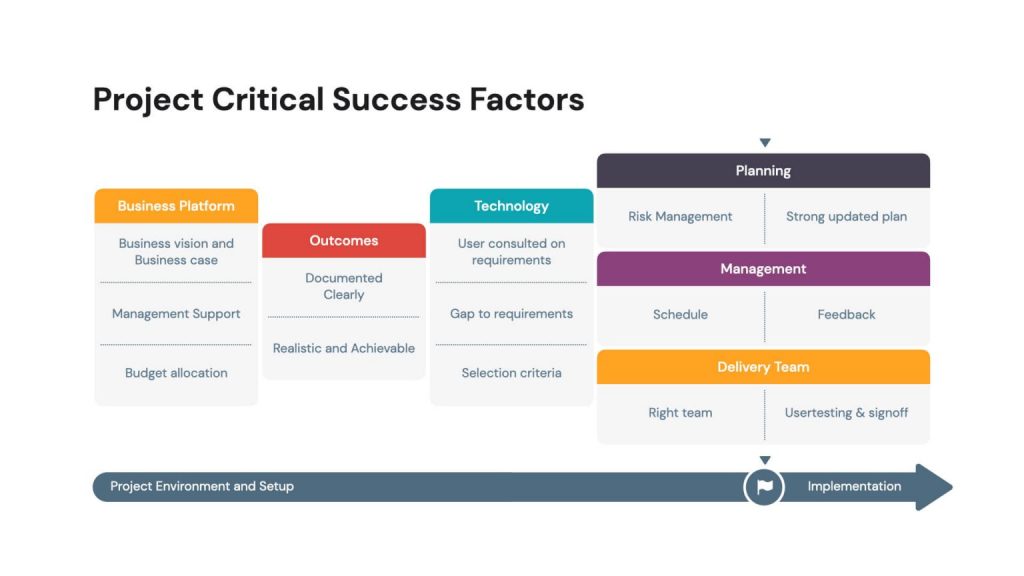Managing projects for over a decade has taught me one key truth: no matter how great your team or tools are, without clearly defined critical success factors in projects, you’re navigating blind.
These factors act as the backbone of any successful initiative, aligning teams, resources, and goals right from the start.
Too often, I’ve seen projects fail not because of a lack of effort, but because success was never clearly defined, tracked, or adjusted as conditions changed. Vague objectives, misaligned stakeholders, and poor communication quietly derail even the best plans.
In this article, I’ll break down what critical success factors really are, why they matter, and how to identify critical success factors in project management, measure, and manage them effectively, so you don’t just start strong, but finish successfully.
What Are Critical Success Factors in Project Management?
Critical success factors are the essential elements an organization must achieve to reach its goals and stay competitive. While project planning often focuses on delivering results on time, within budget, and with top quality, success is no longer a single measure.
Project success is only a combination of “product success” plus “project management success.” The project must meet its target within the given timeframe, budget, and quality standards.
Post-delivery, it must also satisfy market needs to achieve the desired results. Project managers should keenly focus on Critical Success Factors (CSFs). Let’s explore how.
Why Projects Fail Without Defined CSFs?
Many projects start with energy and direction but fall apart mid-execution. The reasons?
- Scope creep
- Lack of clarity
- Misaligned stakeholders
- Poor communication
- Unmeasured performance.
According to PMI’s 2021 Pulse of the Profession report, 35% of projects fail due to inaccurate requirements, and 11% fail due to poor communication.
These are precisely the kinds of pitfalls CSFs are designed to prevent.
When teams don’t define “success” early on, they tend to chase moving targets or lose alignment altogether.
Let me show you a real-life example of how you can use a hybrid tool like a Project Management Software to track progress, focus on your projects, and stay organized:

What Is the Importance of Critical Success Factors in Project Management?
Here are five concise yet impactful reasons highlighting the importance of Critical Success Factors (CSFs) in project management:
1. Provides a Clear Focus
CSFs help project teams stay aligned with top priorities, ensuring resources and time are invested where they matter most.
2. Enables Measurable Progress
By identifying what success looks like, CSFs make it easier to set benchmarks, track milestones, and measure performance accurately.
3. Improves Decision-Making
When critical factors are defined early, leaders can make informed decisions quickly, reducing delays and ambiguity during project execution.
4. Reduces Risk & Miscommunication
CSFs clarify roles, responsibilities, and expectations, minimizing misunderstandings and mitigating risks that arise from vague planning.
5. Drives Stakeholder Confidence
When success is clearly mapped and communicated, stakeholders are more engaged and confident in the project’s direction and outcomes.
What Are the Key Critical Success Factors in Projects?

Source: hislide
Every successful project relies on a few key building blocks that determine its outcome.
These critical success factors (CSFs) act as the foundation for delivering results on time, within scope, and to stakeholder expectations.
1. Strategic Factors
Strategic factors are essential to a business’s long-term success. They include a clear vision, strong leadership, and a solid business plan. Without these critical factors, a business is likely to struggle.
2. Environmental Factors
Environmental factors are external to the business but critical for success. They include things like economic conditions, regulatory environment, and customer preferences. Understanding and adapting to these factors is essential for businesses to thrive.
3. Industry Factors
Industry factors are specific to the industry in which a business operates. These factors include competition, technological advancements, and changing customer needs. Keeping up with industry trends is critical for success.
4. Temporal Factors
Temporal factors are those that change over time. These can include things like market trends, consumer preferences, and even the availability of resources. Businesses that can adapt to these changes are more likely to succeed.
5. Management Factors
Management factors are critical at the operational level. These include effective communication, efficient processes, and good employee relations. A strong management team is essential for a business to thrive.
Let us now check out how to identify critical success factors in project management.
How to Identify CSFs
Your critical factors depend on your project and vary according to the requirements/expectations.
However, in general, these can be identified by following the steps below:
1. Define Project Goals
Firstly, the SMART goal-setting process is used to define the goals. It means that the project goals should be:
- Specific
- Measurable
- Achievable
- Relevant
- Time-bound.
Wrong goal: “Change the website design and make it user-friendly.”
SMART goal: “Make the user interface more friendly by changing the theme and widgets, and making navigation intuitive within a week.”
Every stakeholder should be able to understand the goal and its importance. Any project can be successful if the people involved know WHY it needs to succeed, WHAT the business value it will bring, and WHO will benefit. It will drive people to work with more motivation and in the right direction.
Use this SMART Goals to CSFs Conversion Worksheet:
2. Understand the Project Scope
To successfully manage the project, you must first understand the project scope. This helps you better understand tasks and their priorities. With a proper structure in place, you will know exactly what path to follow for project success.
Next comes the project management dependencies. This simply means the dependency of one task on another. Identify these dependencies and set the time frame for different tasks. Learn more about prioritizing tasks and saving time by working effectively.
Identify the project’s completion time and how to deal with changes that might affect the scope. Finally, a project scope statement will be created and presented to stakeholders.
3. Communicate at Every Stage
Projects are often long and dynamic, so you need to know all the stakeholders and their roles. To make this process smooth, you can connect everyone with the project via a single channel, i.e., project management software.
With everyone on the same page, it becomes easier to identify the success factors based on daily communication with the team and weekly/monthly interactions with the top management.
With a centralized communication channel, you can also track members and inform them about matters related to the project tasks.
4. Manage Potential Risks
Risk is an inherent part of all projects. While planning for any project, every manager should consider this one question: “What can go wrong?”
It sounds negative, right? No, it is practical. Because there will be issues, and you need a risk mitigation plan to march toward success. The first step is identifying all the relevant risks during the project planning phase.
Whenever a risk occurs, interact with stakeholders to find an effective solution to eliminate or mitigate it. Go for the root causes and always consider the potential impact the risk can have on your project’s success.

Measuring & Monitoring CSFs: Quick Tips
Your CSFs are only as good as your ability to track them. Here’s how:
- Define measurable metrics for each CSF (e.g., “80% user adoption within 30 days”).
- Use project dashboards or OKR tools to track real-time progress.
- Review regularly — weekly or biweekly check-ins are key.
- Link to ROI: For instance, a CSF like “reduce onboarding time by 20%” can tie directly to cost savings.
Adapting CSFs When Projects Change
Change is inevitable — your CSFs need to evolve, too. Here are some tips:
- Reassess CSFs when project goals or timelines shift
- Communicate changes to all stakeholders clearly
- Use an agile CSF framework: Prioritize flexibility without sacrificing structure.
For example, if your project’s scope expands to include international users, a new CSF might be: “Translate core features to 3 target languages before beta launch.”
Unlock the Power of Critical Success Factors for Project Success
Critical success factors (CSFs) are the essential elements that determine whether a project succeeds or fails. From stakeholder alignment and clear goals to effective communication and risk management, these factors provide the structure every project needs to stay on track and deliver results.
This blog explored how to define, measure, and adapt CSFs, along with examples, practical tips, and tools like templates and checklists. When CSFs are clearly outlined and monitored, they guide decision-making and help teams stay focused on what matters most.
ProProfs Project simplifies project management by helping you define CSFs, assign tasks, and track progress in real time. With built-in AI features like automated task suggestions, smart reports, and predictive timelines, it’s easy to keep your project aligned with its success factors from start to finish.
Frequently Asked Questions
What can lead to project failure?
Major factors that can lead to project failure include a lack of a scope document, poor planning, a lack of communication, unrealistic expectations, an inexperienced team, poor project monitoring, and no risk management strategies. All of these factors eventually contribute to missing deadlines and exceeding the budget.
What is the most critical success factor in managing teams?
Trust and communication are the key success criteria in managing teams. When everyone is on the same page, it leads to increased productivity. The project manager is responsible for building trust and getting team members to open up to each other.
FREE. All Features. FOREVER!
Try our Forever FREE account with all premium features!




